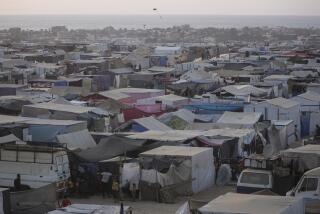Sharon Has Harsh Words for Korei as Court Case Unfolds
- Share via
JERUSALEM — In an angry exchange that could bode ill for direct Israeli-Palestinian talks, Prime Minister Ariel Sharon said in remarks published Tuesday that his Palestinian counterpart, Ahmed Korei, led “a government of murder and lies.”
Korei, in a response to reporters in Ramallah, called Sharon’s statement “totally unacceptable” and said: “We do not have murderers. We have a cause.”
The sharp words from both sides came against a highly emotional backdrop.
Israelis are reeling after the second suicide bombing in less than four weeks in the heart of Jerusalem, an attack on a crowded bus Sunday that killed eight Israeli passengers.
Palestinians for two days have been staging large and sometimes unruly demonstrations in opposition to the barrier Israel is building in and around the West Bank. Their protests are timed to coincide with a hearing on the matter at the International Court of Justice in The Hague. The U.N. General Assembly has asked the world court to make a nonbinding ruling on the legality of the barrier.
Korei and Sharon have not met face to face, even though the Palestinian premier was appointed to his post nearly six months ago. The Bush administration has been exerting pressure on both sides to hold direct talks to try to revive a flagging U.S.-backed peace plan.
Sharon was angered by comments Korei made after Sunday’s bombing. The Palestinian prime minister criticized the attack for giving Israelis a pretext to press ahead with construction of the 450-mile barrier, which Israel contends is needed to protect against suicide bombings.
The mass-circulation daily Yediot Aharonot said Sharon was infuriated by what he interpreted as an implication by Korei that the bombing was deplorable primarily because it could weaken the Palestinians’ case before the world court.
“It will be impossible to reach an agreement with this government,” the newspaper quoted Sharon as saying.
Palestinian officials -- and some observers on the Israeli side -- saw Sharon’s comments as helping to set the stage for implementing a contingency plan he has been developing in the event that peace efforts fail. Under its emerging outlines, Israel would unilaterally evacuate nearly all the Jewish settlements of the Gaza Strip, but would probably annex some large settlements in the West Bank.
Palestinians say that would amount to Israel imposing upon them the borders of their future state, without negotiations to determine its size and shape.
Tuesday’s demonstrations against the barrier were smaller than those on Monday, when the court hearing opened in The Hague. But they again turned to stone-throwing confrontations with Israeli troops in two villages near Ramallah, West Bank.
In The Hague, a cold, wind-swept rain limited the size of the pro- and anti-barrier demonstrations. The most prominent presentation during the second day of the hearing came from Jordan, which fears an influx of Palestinian refugees if the barricade is finished. The Jordanians argued that the wall would squeeze the Palestinian population into an economically unsustainable area, triggering a massive exodus.
“With the exception of the Palestinians themselves, we feel we Jordanians are the ones who could be most affected by Israel’s decision to place the wall where it has and where it intends to do so in the future,” said Prince Zeid Raad al Hussein, head of the Jordanian delegation.
He also dismissed Israeli claims that the wall was strictly an anti-terrorist measure that could be removed should the suicide bombings stop.
“If the wall had been constructed wholly within Israel’s sovereign territory, these proceedings would not have come about,” he said.
Fourteen countries and organizations are to speak before the court hearing ends Wednesday, with most defending the Palestinian assertion that the barrier is unlawful. Among them: Indonesia and Cuba, which told the court Tuesday that the barrier would turn the Palestinians into a “population of prisoners.”
“I’m not sure the Palestinians are completely comfortable with the company they’re keeping,” replied Daniel Taub, the Israeli delegation’s senior lawyer.
Reflecting the highly charged atmosphere in Israel while the hearings are underway, Deputy Defense Minister Zeev Boim set off a controversy with comments Tuesday at a memorial for victims of a terrorist attack on an Israeli bus in the late 1970s.
“What is it about Islam as a whole and the Palestinians in particular?” Boim asked. “Is it some form of cultural deprivation? Is it some genetic defect? There is something that defies explanation in this continued murderousness.”
At least two Israeli Arab parliamentarians, together with several Israeli lawmakers, called for Boim’s resignation and demanded that he apologize.
“These are very grave and ugly generalizations, which have nothing to do with the truth,” said lawmaker Avshalom Vilan of the dovish Meretz Party.
He likened Boim’s rhetoric to the type of hate speech “that ended with the Holocaust.”
Special correspondent Bruce Wallace in The Hague contributed to this report.
More to Read
Sign up for Essential California
The most important California stories and recommendations in your inbox every morning.
You may occasionally receive promotional content from the Los Angeles Times.












